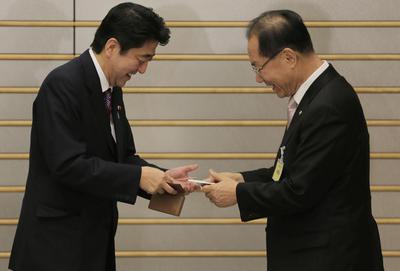Abe seems to have adopted policies based on pragmatic and creative realism, and not chauvinistic nationalism, as was feared by some before he took office.
First, Abe has gathered a strong and effective team to implement foreign policy. At the cabinet level, the new foreign minister, Fumio Kishida, is known to have long-standing relations with Okinawa and has been taught well about Asia. Two Ministry of Foreign Affairs (MOFA) officials who were behind Abe’s success in his first cabinet (2006–07) have joined the Prime Minister’s Office. Shotaro Yachi, who then served as vice Minister for Foreign Affairs, is a special advisor to the cabinet. Nobukatsu Kanehara, who served Yachi at the Directorate of Policy Planning and is known for shrewd strategic thinking, is now assistant Chief Cabinet Secretary. Yachi and Kanehara could prove excellent advisors to Abe and their policy coordination with other top MOFA officials will be seamless.
Second, on the most urgent and dangerous issue of the Senkaku islands, Abe’s message at this point seems to be reasonably balanced. Abe asserts that Japan’s deterrence capability should be strengthened and the 2010 National Defense Program Outline revised. Given China’s position and the possible need to resort to force to change the status quo on the islands, Abe seems to have no other policy option. At the same time, Abe has not hinted that he might change the present state of control of the Senkakus by considering ‘permanent stationing of civil servants’ as was stipulated in the Liberal Democratic Party platform. While declaring ‘the Senkakus is our territory so there is no room for negotiations’ may not be the wisest start to a serious dialogue with China, Abe’s language does not seem to have provoked the Chinese leadership.
His emphasis on relations based on strategic and mutual interests, a policy adopted during his first cabinet, is noteworthy. Continuing support for the 1995 Murayama Statement of apology for acts committed during the war and the absence of a visit to Yasukuni Shrine are also encouraging. His intention to create a new statement with a ‘future-looking orientation’ does not seem to be a priority for him now. Though his Chief Cabinet Secretary emphasised that a new statement would be based on continued support of the 1995 statement, such a statement would engender extremely complicated debate at home and abroad, which Abe certainly does not need.
Third, given tense Japan–China relations, the alliance with the United States naturally has unprecedented importance. Abe’s choice to visit the US first is the right one, and his firm direction to eradicate the unfair asymmetry under Article 9 of the Constitution must encourage President Obama. The current interpretation of Article 9 bans collective self-defence, so Japan cannot reciprocate the United States’ pledge to defend it. On the Okinawan bases issue, Foreign Minister Kishida’s cautious media statement that the Okinawan people’s thinking should be weighed deeply seems to strike a very thoughtful point. And on China, in addition to his deterrence efforts, Abe could reassure Obama that his policy of dialogue is serious and that he will mobilise all diplomatic skills to avoid military collision with China.
Fourth, another critical agenda item is South Korea. Abe has already sent a positive signal by refusing to make Shimane Prefecture’s Takeshima Day a national day of recognition, and Fukushiro Nukaga, an LDP parliamentarian who has ties with South Korea, visited Seoul on a fence-mending mission.
But what will Abe do with the comfort women issue? From March until June 2007 this single issue could have ruined Abe’s international reputation: his statements were reported as making him a ‘comfort women denier’. But it was the Yachi–Kanehara team at MOFA that succeeded in putting out the fire by advising Abe to go back to his position of ‘humility’. That crisis resulted in a US Congressional Resolution requesting an unequivocal apology from Japan. Let us hope that again, Abe will listen to advice from his wise men and find a solution based on constructive realism and humility. Furthermore, Nukaga’s apparently successful visit to Seoul cannot possibly be understood without the context of ‘behind the curtain’ (nemawashi) talks to settle this issue, especially if President Park is envisaged to make a trip to Japan soon. So let us see how this issue is going to be handled without making a too precipitous judgment.
Fifth, there is the Russian Federation. Upon assuming the post of president in March 2012, Vladimir Putin made it abundantly clear that he intends to substantially improve relations with Japan, notably through strengthening economic cooperation and resolving the territorial dispute over the Kuril islands. Putin no doubt has warm memories of Abe’s first cabinet, when Foreign Minister Taro Aso supported a new ‘extraordinary idea’ of dividing the islands in half, and by his own ‘Initiative for Strengthening Japan-Russia cooperation in the Far East Russia and Eastern Siberia’ made at the Heiligendamm Summit in June 2007. The first telephone exchange with Putin shortly after Abe’s assumption of power seemed to initiate a new relationship with real dynamism.
If Abe succeeds in 2013 in containing his difficulties with China and South Korea, strengthening the alliance with the US, and trying to finally resolve the territorial issue with Russia, Japan’s international standing in one year’s time shall be completely different.
Kazuhiko Togo is director of the Institute for World Affairs at Kyoto Sangyo University and former Ambassador of Japan to the Netherlands.
A version of this article was first published here by the Pacific Forum CSIS.

